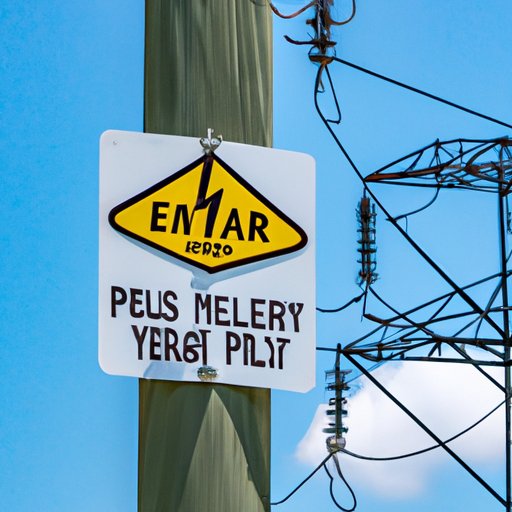Introduction
Power lines are a critical part of our infrastructure, providing us with essential electricity and other utilities. While they are generally safe, it is important to understand the dangers associated with power lines and exercise extreme caution around them. This article will explore when it is most important to exercise extreme caution around power lines.

Understanding the Risks of Power Lines
Power lines carry large amounts of electricity that can cause serious injury or death if not handled properly. Common electrical hazards associated with power lines include electrocution, electric shock, burns, and fires. In addition, contact with power lines can result in severe injuries or fatalities due to the high voltage of the current running through them.
It is important to recognize that even minor contact with power lines can be dangerous. For example, using metal ladders or tools near power lines can cause an electric arc, which is a spark of electricity that can jump from the power line to the ladder or tool. This can lead to serious injury or death if someone is in contact with the ladder or tool at the time.

Recognizing Signs of Danger Around Power Lines
It is important to be aware of potential signs of danger around power lines. Visible signs of danger such as sparks or arcs indicate that there is an electrical hazard present. Additionally, warning signs indicating a potential hazard should be taken seriously and avoided.
In some cases, power lines may have additional safety features such as insulated wires or barriers that protect against contact with the lines. It is important to look for these features and take extra precaution when they are not present.
Knowing How to Stay Safe Near Power Lines
Staying safe near power lines requires knowledge of safety precautions and how to respond in an emergency involving power lines. The following safety tips can help you avoid contact with power lines:
- Stay at least 10 feet away from power lines.
- Do not use metal ladders near power lines.
- Be aware of overhead power lines when working outdoors.
- Never touch or attempt to move a power line.
- Keep children and pets away from power lines.
In the event of an emergency involving power lines, it is important to call 911 immediately and take proper safety precautions. Do not try to help anyone who may be in contact with the power line, as this could put you at risk of electrocution. Instead, wait for trained personnel to arrive and assist.

Tips for Avoiding Accidental Contact with Power Lines
Accidental contact with power lines can be prevented by following certain safety tips. Staying at least 10 feet away from power lines is the best way to avoid contact with them. Additionally, it is important to avoid using metal ladders near power lines, as this increases the risk of electric arcs. If you must use a metal ladder near a power line, make sure it is non-conductive.
What to Do in Case of an Emergency Involving Power Lines
In case of an emergency involving power lines, it is important to call 911 immediately and take proper safety precautions. Do not attempt to move the power line or help anyone who may be in contact with it, as this could put you at risk of electrocution. Wait for trained personnel to arrive and assist.
If you are ever in contact with a power line, do not try to move away. Instead, remain in contact with the line and shuffle your feet until help arrives. This will reduce the risk of electric shock, as long as you remain calm and do not let go of the line.
Dispelling Common Myths About Power Line Safety
There are many myths about power line safety that can lead to dangerous situations. It is important to debunk these myths and clarify the importance of following safety procedures around power lines. Some common misconceptions include that power lines are insulated, that rubber gloves provide protection against electric shock, and that wet surfaces are safe to touch.
In reality, power lines are not insulated and rubber gloves do not provide protection against electric shock. Additionally, wet surfaces can increase the risk of electric shock, as water is a conductor of electricity. It is important to remember that power lines can be extremely dangerous and should always be approached with caution.
Conclusion
Power lines can be extremely dangerous and should always be approached with caution. It is important to understand the risks associated with power lines and recognize signs of danger. Knowing how to stay safe near power lines and taking steps to avoid accidental contact are key to preventing injuries and fatalities. Dispelling common myths about power line safety can also help ensure that people stay safe around power lines. By following the safety tips outlined in this article, you can stay safe when near power lines.
(Note: Is this article not meeting your expectations? Do you have knowledge or insights to share? Unlock new opportunities and expand your reach by joining our authors team. Click Registration to join us and share your expertise with our readers.)
